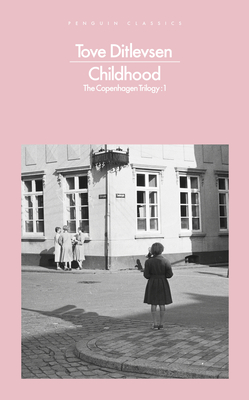By the time she was ten years old Tove Ditlevsen knew she wanted to be a poet. The biggest obstacle to that dream was the times in which she lived. Born in 1917, the best her family could hope for her was that she marry a “stable skilled worker” whose wages aren’t siphoned off at the pub on the way home. This gap between expectation and aspiration forms the conflict at the heart of this novelised memoir spanning her early years.
But vocational dreams are only the mid-point of Ditlevsen’s Childhood (1967, tr. Tiina Nunnally, 1985), the first in her Copenhagen Trilogy, followed later by Youth and Dependency. Ditlevsen’s Copenhagen is a slum, riddled with alcohol and teenage pregnancy; her childhood spent in a small crumbling apartment where, for two kroner more in rent, they could have a view and have been viewed as “finer people”. Instead, they look out on the tenement’s dark back court where only a “square scrape of sky” is visible.
That literal rear view may not be something to write about, but Ditlevsen’s looking back is a blend of present tense immediacy as she lingers in moments while the past tense snaps up larger periods of time. Thought she occasionally serves up poetic fireworks her tone is mostly composed; not quite void of emotion, but certainly holding back as an objective viewer of her own past.
Childhood is dark and it’s always moaning like a little animal that’s locked in a cellar and forgotten. It comes out of your throat like your breath in the cold, and sometimes it’s too little, other times too big. It never fits exactly. It’s only when it has been cast off that you can look at it calmly and talk about it like an illness you’ve survived.
What she has survived is a childhood with few friends, her aloofness seeing her prefer reading over play. Her withdrawn nature’s root cause is clearly her home life. Her socialist father just pats her on the head because “he doesn’t know what he should say to little girls”; her relationship with her mother is “close, painful, and shaky”, no doubt affected by her own family tragedies; and a sibling who, as a boy, has a custom made childhood while hers seems “made for a completely different girl.”
Although there are warm moments in her life — visits to her grandmother, the singing of songs — the only real friend is Ruth, two years her junior. Her fearlessness in introducing herself captivates the shy Tove, who follows her as they tour the city’s seedier streets and get their kicks – and chocolate – shoplifting. But even this friendship is at odds with the burgeoning poet.
I make myself into her echo because I love her and because she’s the strongest, but deep inside I am still me. I have my dreams about a future beyond the street, but Ruth is immediately tied to it and will never be torn away from it.
“Childhood is long and narrow like a coffin, and you can’t get out of it on your own.” Ditlevsen observes. While the people moulded her experience, words were clearly the way forward. When solace could only be found in those safe spaces where “long, mysterious words began to crawl across my soul like a protective membrane” then a world of words seems the best security. The relatable awe in visiting a library for the first time seems the safest haven in such a world.
The idea of a library returns again, imagined as a childhood resource. A memory bank from which one can learn not from books but from experience. And this is the deep well of memory that Ditlvesen draws from, looking back and recognising the cause and effect that her younger self could not have maturely processed, in turn shining a light on the initially unknown path that time has gradually revealed.
Despite being a thin work, there’s a lot packed in, and the delivery is thoroughly enjoyable. Ditlevesen’s withdrawn tone never detracts from our own ability to experience the emotion in her events, and those moments are typically served with bite and a weight that contradicts their lightness. The resonance of the memoir perhaps has its roots in her mother’s belief that books are full of lies counterbalanced with the poet’s assertion that “you sometimes have to lie to bring out the truth.” As a novelised memoir, Childhood works like those tenement windows with their limited view, looking down on a section of the past, but it feels that it only may be fully appreciated with the full trilogy’s conclusion, to see how this journey in learning to express herself manifests in later life.
